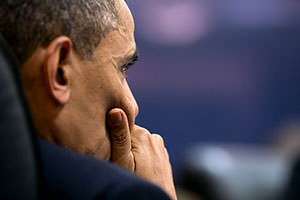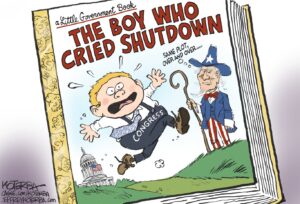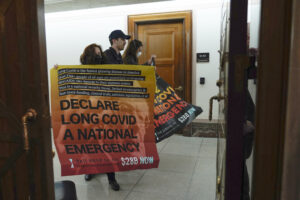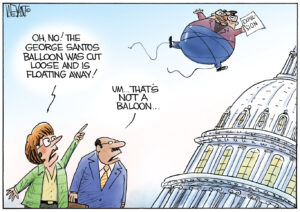Declaring the 9/11 Era Over
President Obama wisely avoided the phrase "mission accomplished" in his major speech last week about the "war on terror," but columnists aren't obliged to be so circumspect: It is time to declare victory and get on with our lives.
President Obama wisely avoided the phrase “mission accomplished” in his major speech last week about the “war on terror,” but columnists aren’t obliged to be so circumspect: It is time to declare victory and get on with our lives.
Obama could never say this, of course, because there will surely be future terrorist attacks that kill Americans both at home and abroad. But he came close when he said that “the scale of this threat closely resembles the types of attacks we faced before 9/11” — in other words, before we rashly declared war on a tactic rather than an enemy.
“We must define the nature and scope of this struggle, or else it will define us,” Obama said. “We have to make decisions based not on fear, but on hard-earned wisdom. That begins with understanding the current threat that we face.”
Osama bin Laden’s al-Qaeda, the organization that flew airliners into the World Trade Center and the Pentagon, is decimated and on the run. But franchise groups, some bearing the al-Qaeda name, in Yemen, Somalia, Iraq and Mali pose a lesser but real threat to the United States. Meanwhile, the Arab Spring empowered — and armed to the teeth — ad hoc groups across the region that share al-Qaeda’s zeal for Islamist jihad and can mount deadly local attacks, such as in Benghazi. And individuals here in the “homeland” — still, to my ear, an off-key word — can commit mayhem in the name of jihad, as we saw in Boston.
“Lethal yet less capable al-Qaeda affiliates. Threats to diplomatic facilities and businesses abroad. Homegrown extremists. This is the future of terrorism,” the president told his audience at the National Defense University in Washington. “If dealt with smartly and proportionally, these threats need not rise to the level that we saw on the eve of 9/11.”
This attempt to enumerate real and potential enemies was the heart of Obama’s speech, in my view. A “war on terror” must endure forever because, as Obama said, “we will never erase the evil that lies in the hearts of some human beings, nor stamp out every danger to our open society.” A war against identifiable foes, however, can be won — and, for the most part, has been.
He could have gone further in talking about the nature of the threat from “radicalized” individuals. What distinguishes their crimes from other senseless acts of violence? Put another way, what would the reaction have been if Adam Lanza, as he murdered 20 children and six adults at Sandy Hook Elementary School, had yelled, “Allahu akbar“?
Was there really any meaningful connection between the Tsarnaev brothers’ bloody Boston rampage and international jihadism? It seems likely that an al-Qaeda website taught them how to build their pressure-cooker bombs, but what about the alienation they obviously felt? What about their mental health? Was jihad anything more than a label, an affinity-group logo like the Red Sox insignia on a baseball cap?
Obama has been saying for years that he intends to leave behind a sound legal and administrative framework for counterterrorism operations against groups or individuals who pose a threat. The long, dense, well-written speech he delivered Thursday was a start. Rather, it was a restart; upon taking office in 2009 he immediately banned torture and secret detentions overseas, but he let pass his best opportunity to close the prison at Guantanamo Bay.
He announced that he will resume transferring some prisoners, especially to Yemen. But despite Obama’s impassioned plea, I think it is highly unlikely that Congress will remove the many restrictions that keep the president from just shutting the place down. Some detainees may still be there when Obama leaves office in 2017.
The president gave the clearest explanation to date of how he decides to use pilotless drone aircraft to kill suspected terrorists overseas. As I’ve written before, the age of drone warfare is here whether we like it or not. I really don’t like it at all. I realize, however, that any president faced with a choice between risking American lives and dispatching a few robots is going to send in the drones.
But armed drones are weapons of assassination, not of war as we know it. They are designed to snuff out a specific human being and those unfortunately nearby, halfway around the globe, like a thunderbolt from a cloudless sky. No amount of judicial or congressional oversight should make us feel great about that.
Eugene Robinson’s e-mail address is eugenerobinson(at)washpost.com.
© 2013, Washington Post Writers Group
Your support matters…Independent journalism is under threat and overshadowed by heavily funded mainstream media.
You can help level the playing field. Become a member.
Your tax-deductible contribution keeps us digging beneath the headlines to give you thought-provoking, investigative reporting and analysis that unearths what's really happening- without compromise.
Give today to support our courageous, independent journalists.






You need to be a supporter to comment.
There are currently no responses to this article.
Be the first to respond.